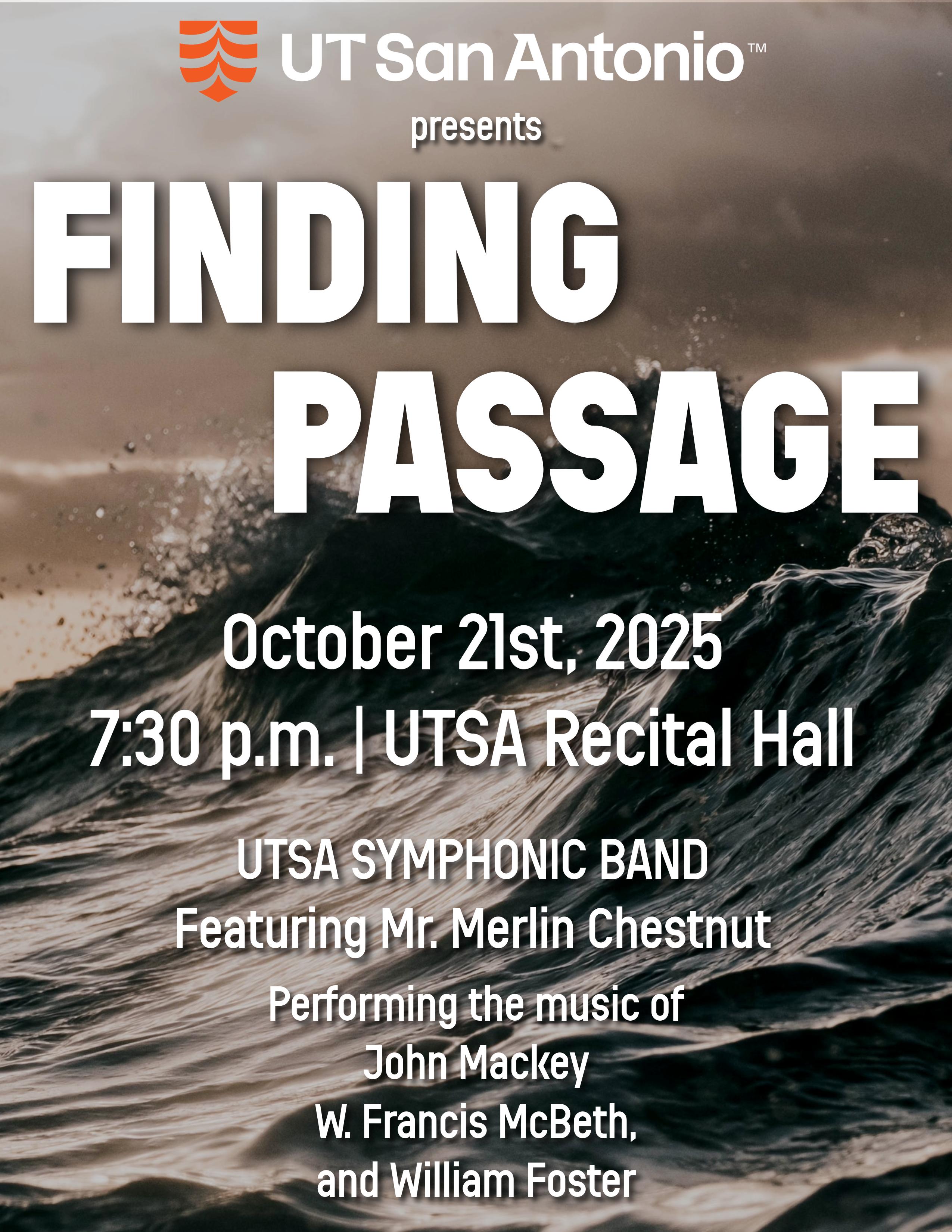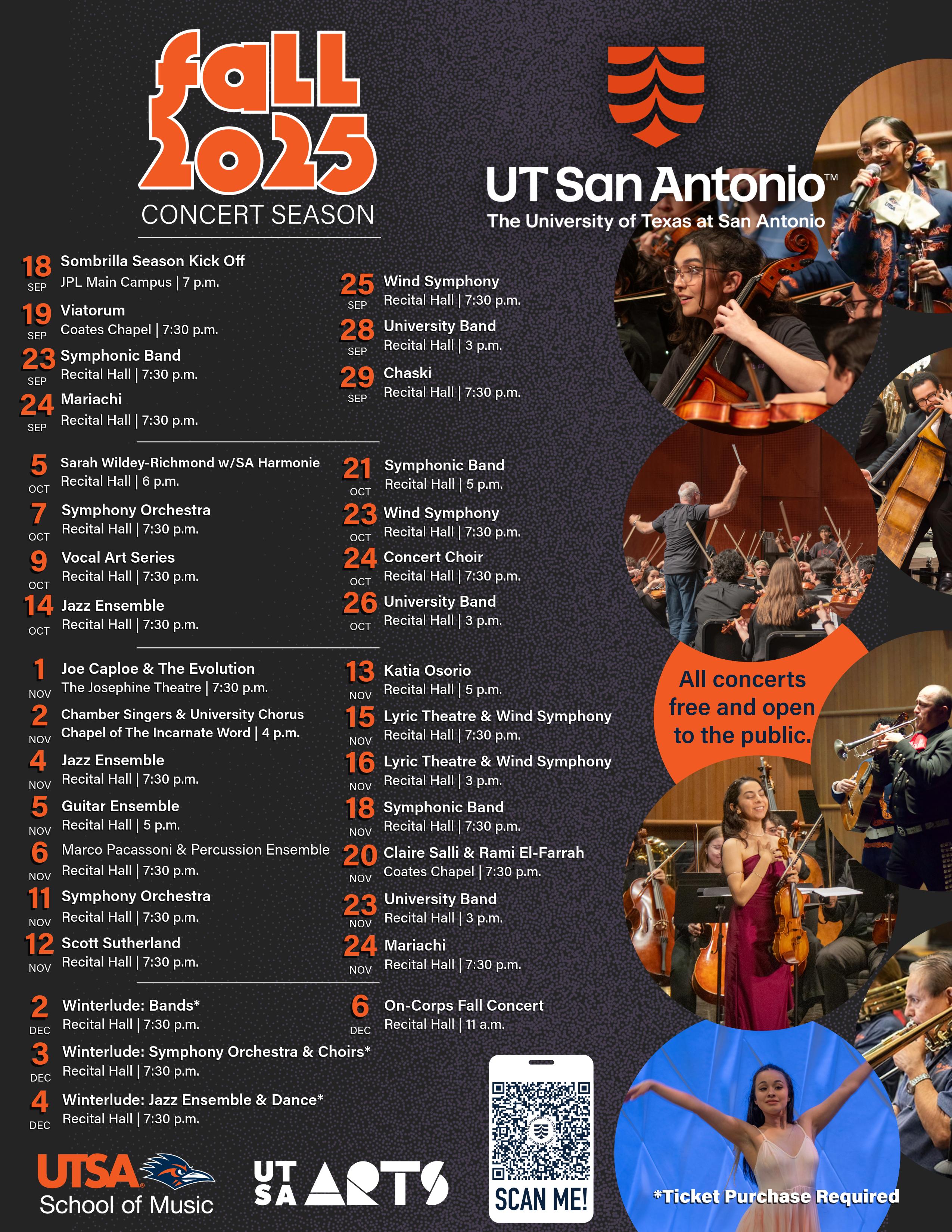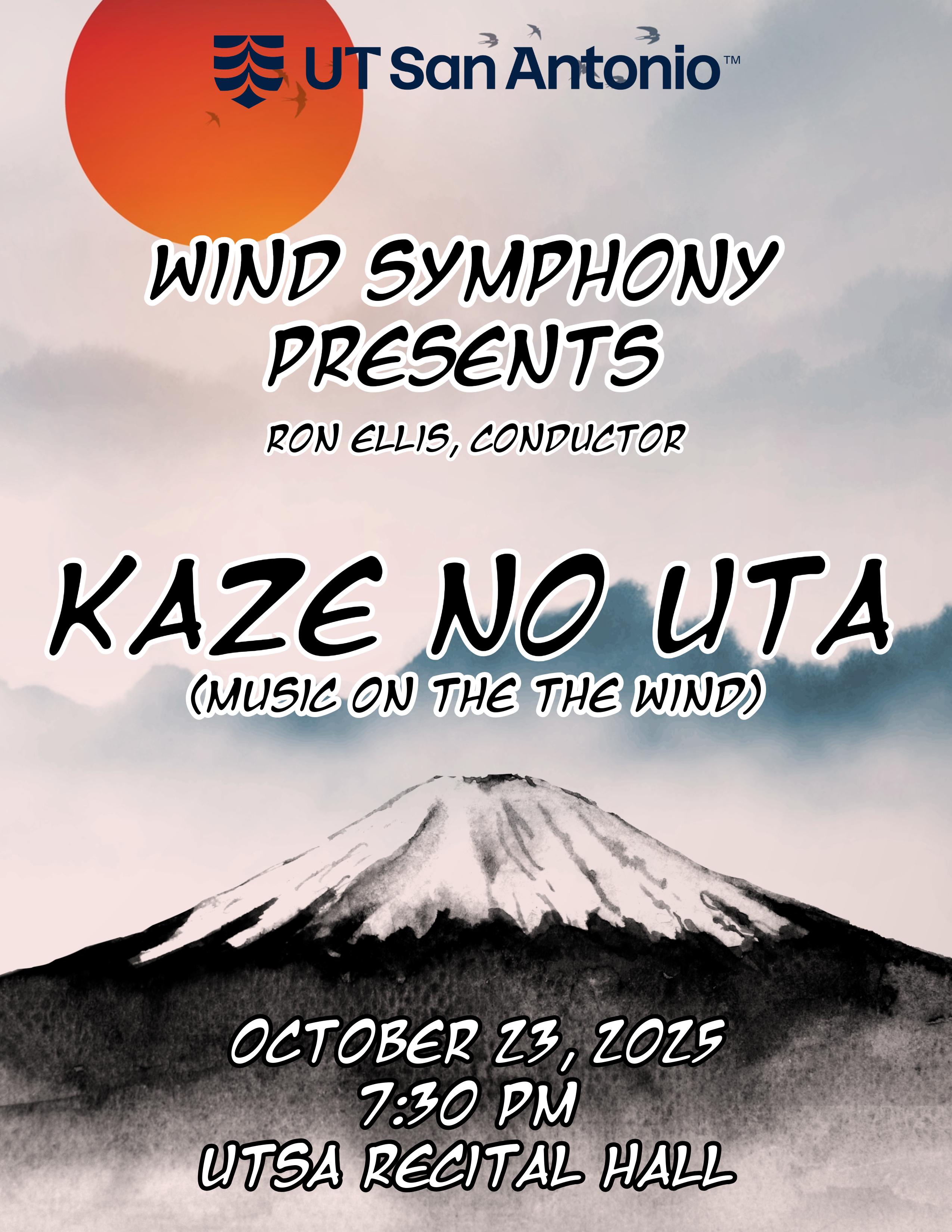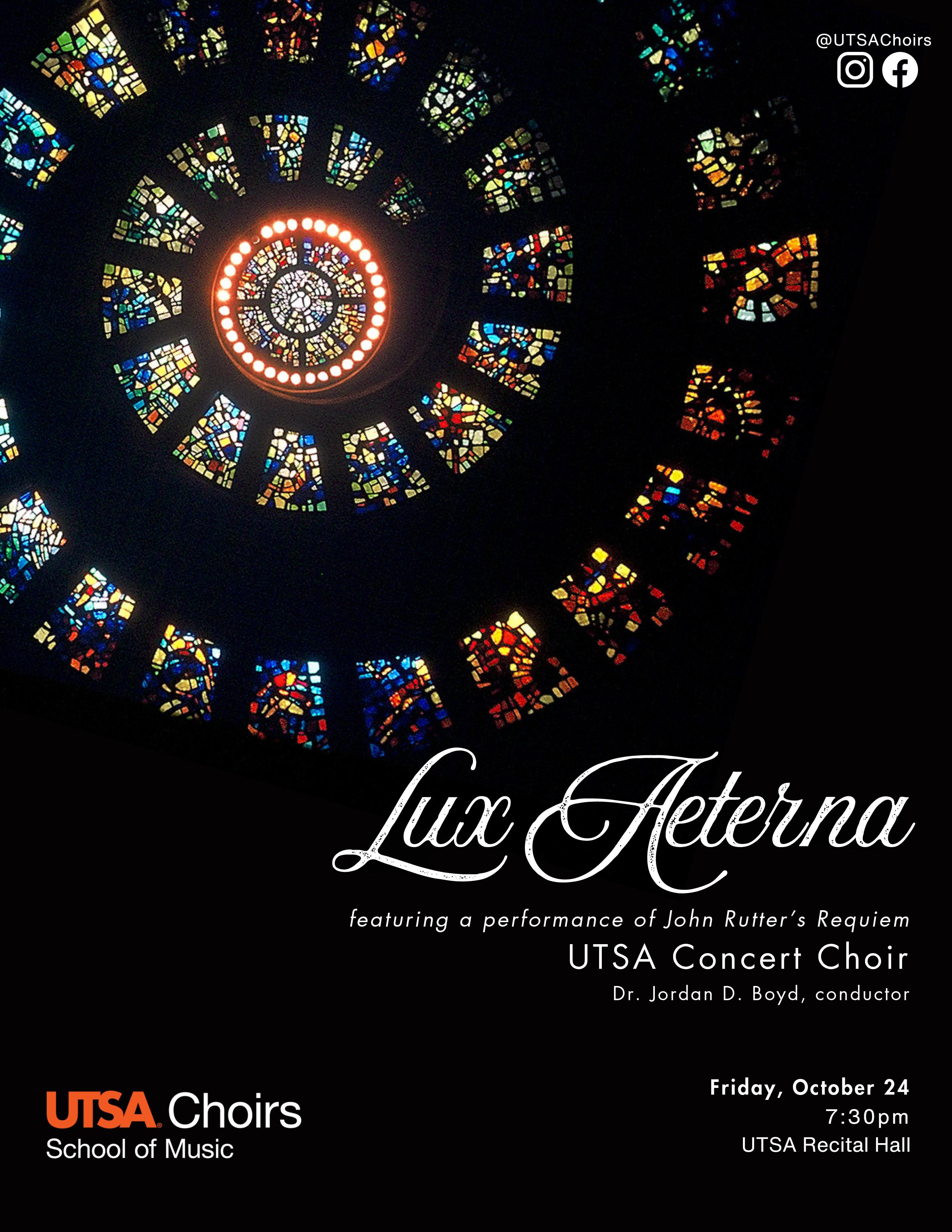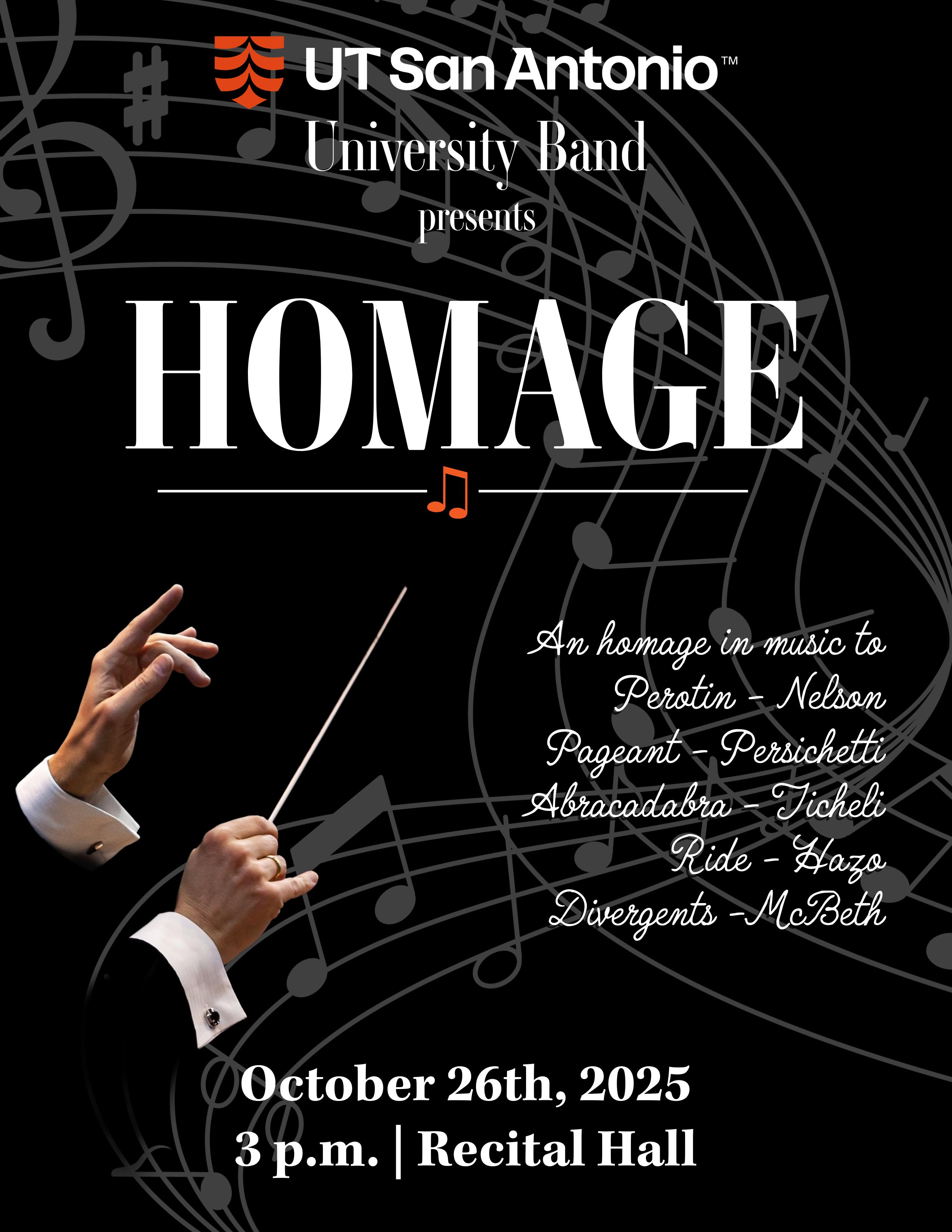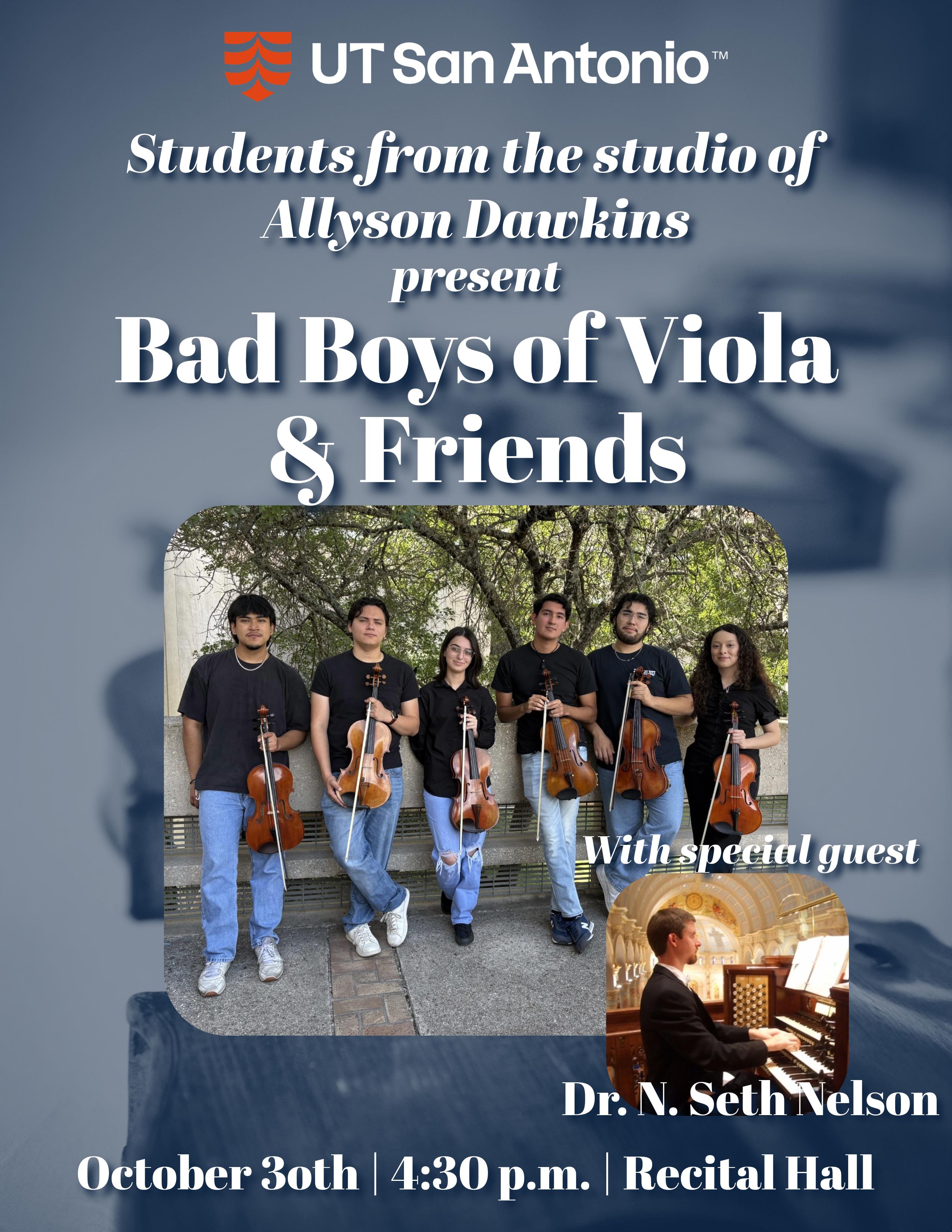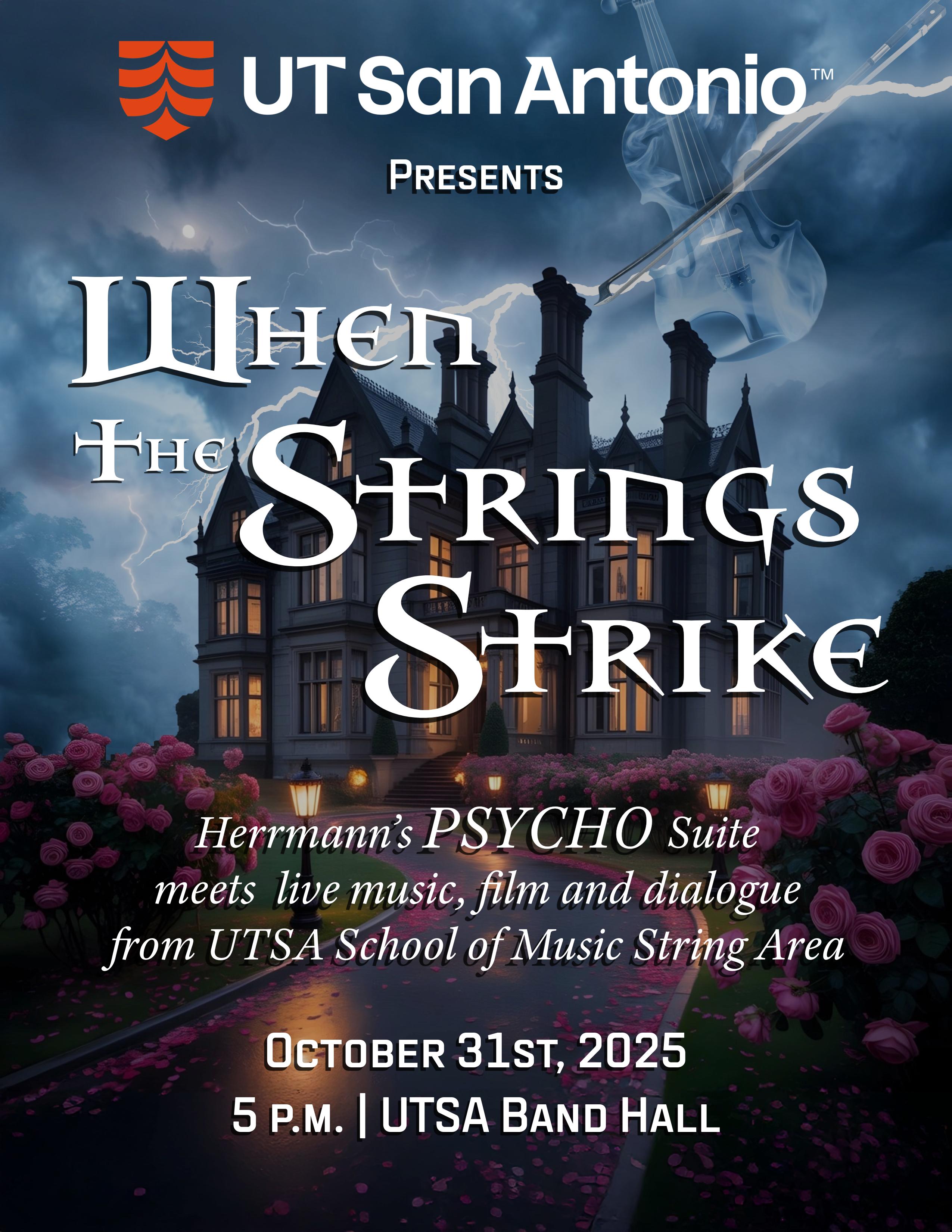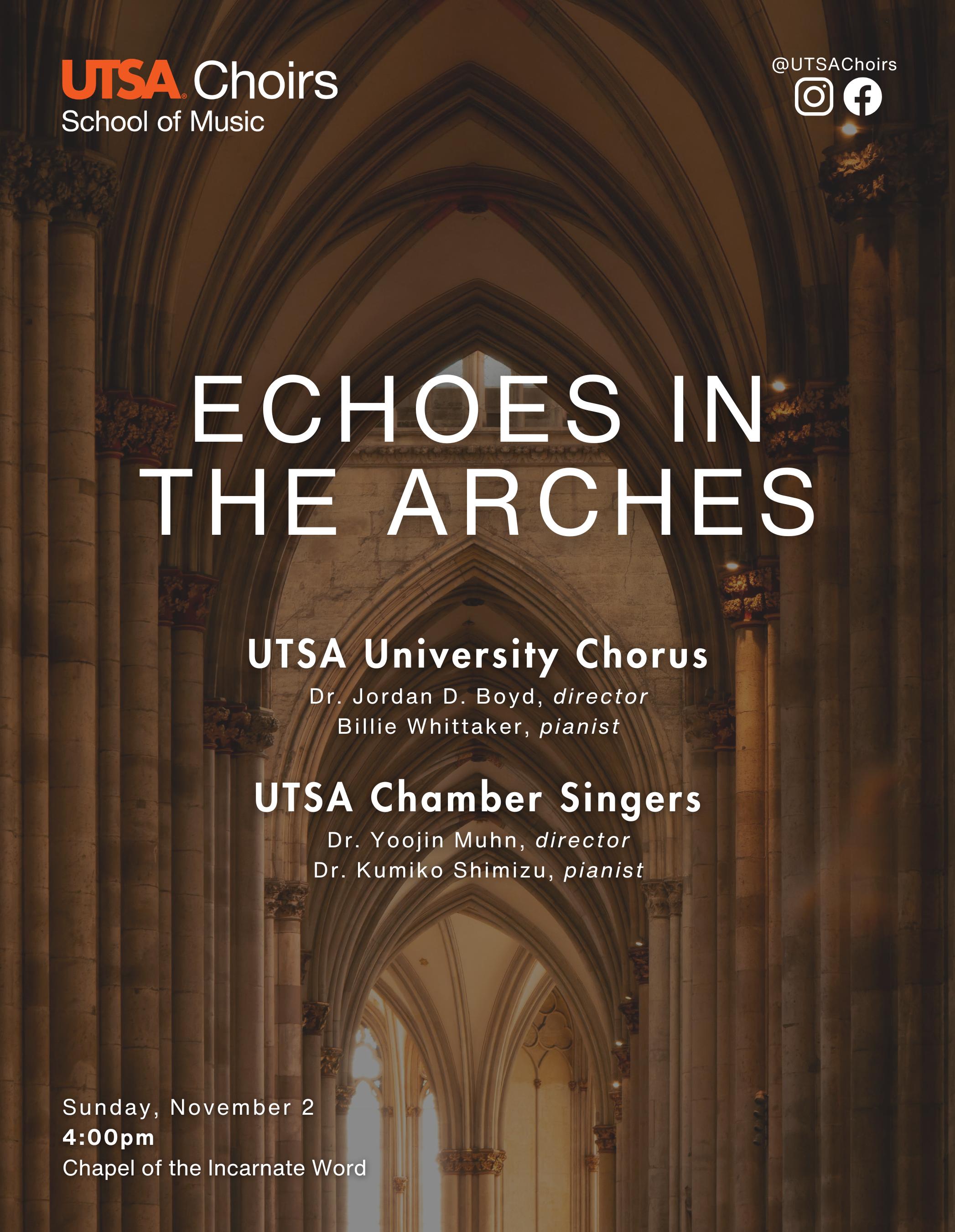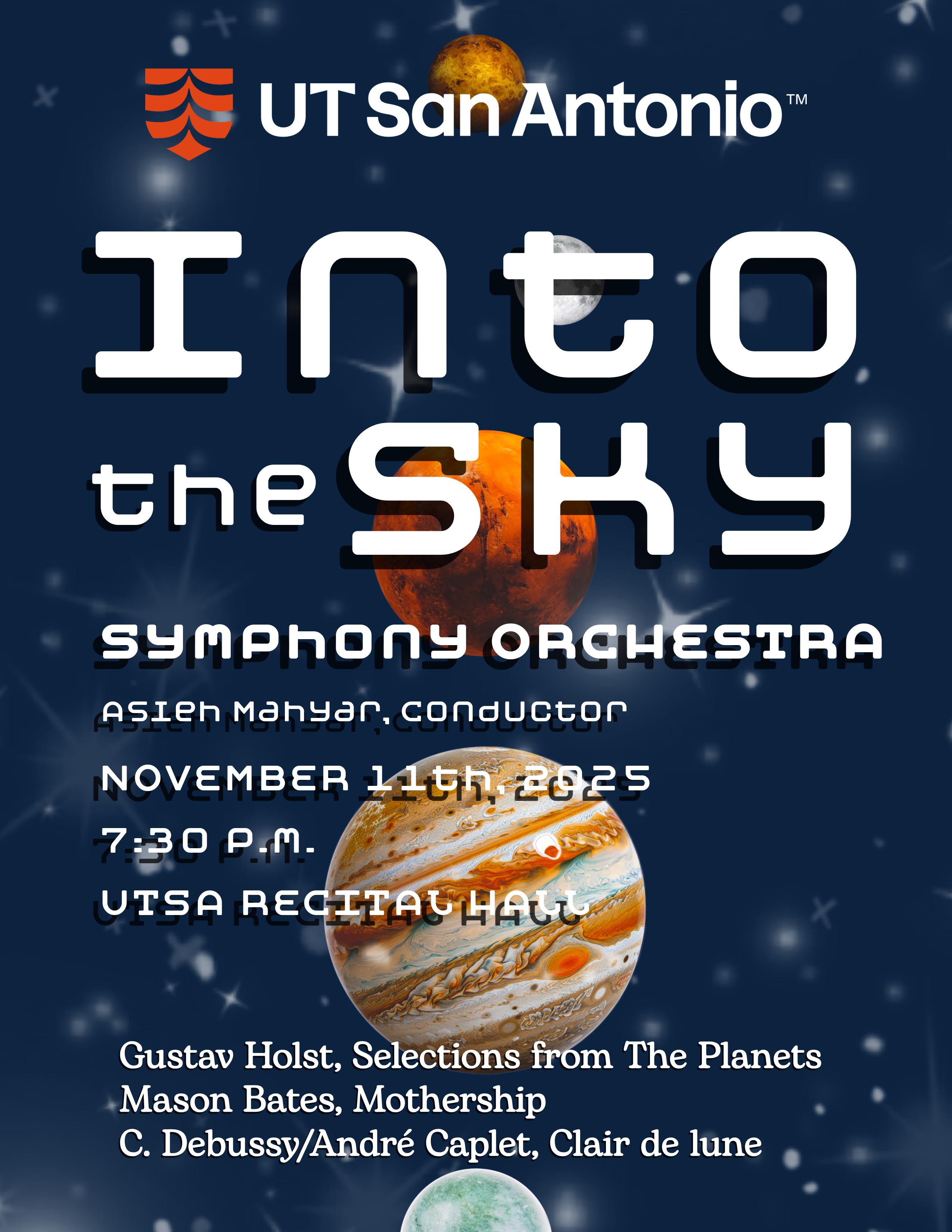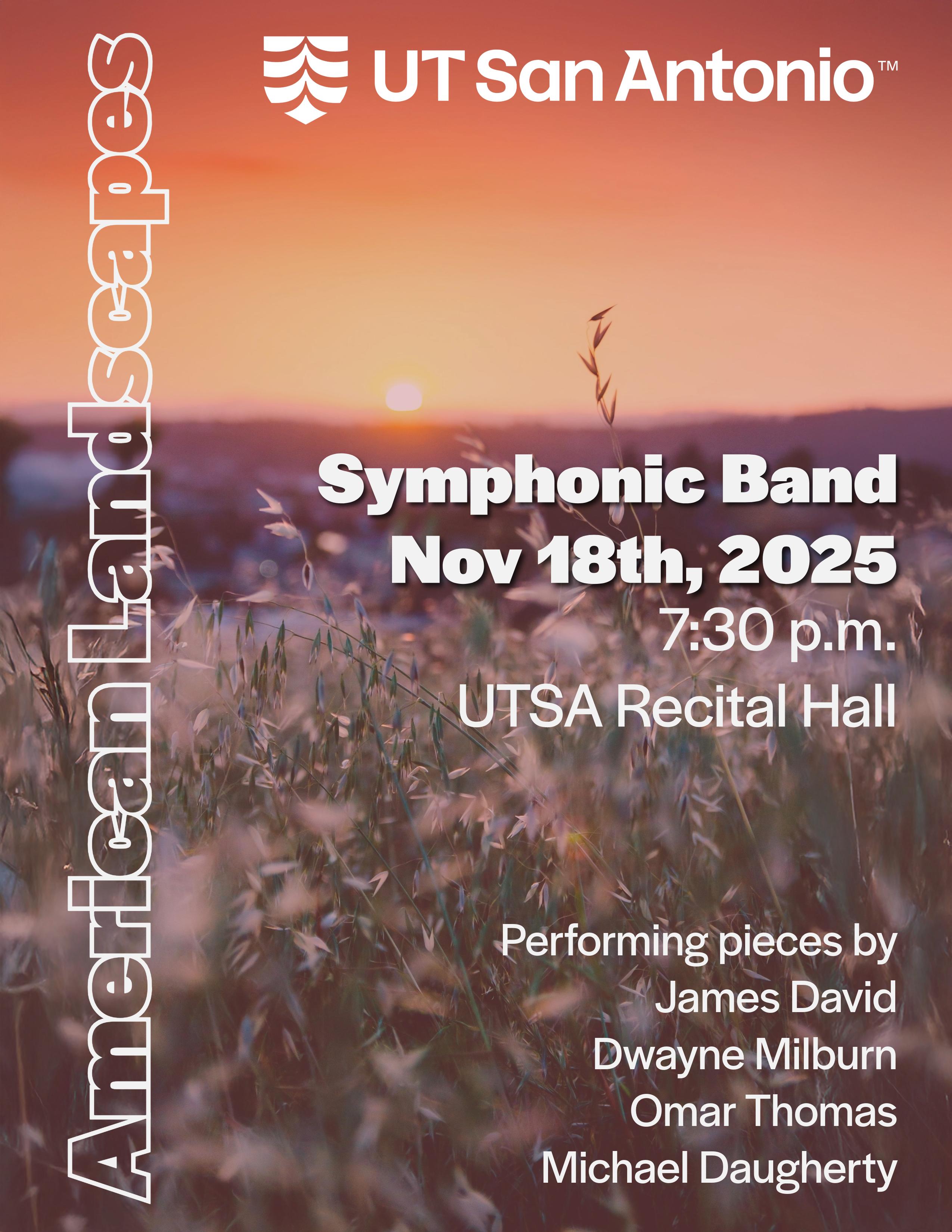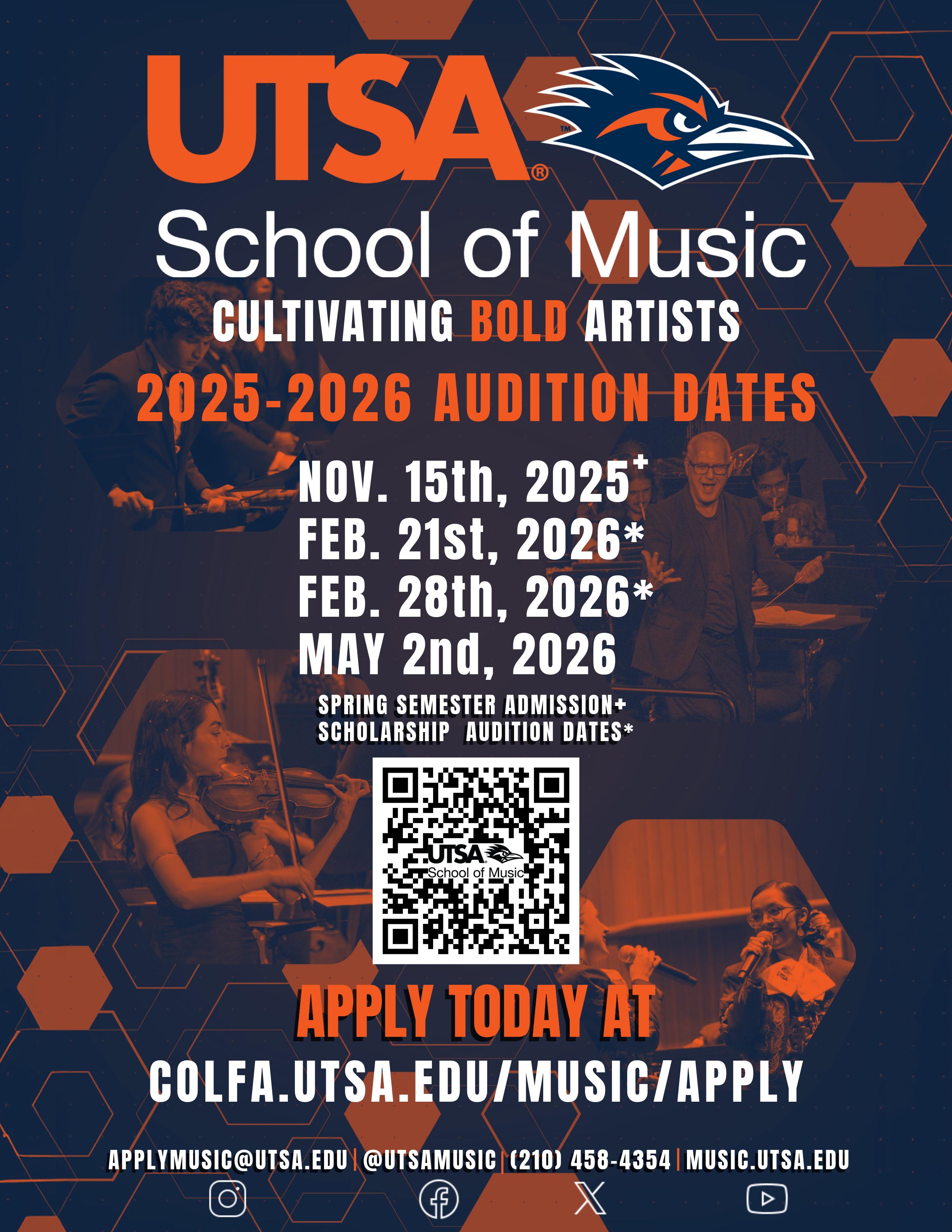University of Texas at San Antonio Symphonic Band
Music Performance (Bakersfield, CA)
Joaquin Carcamo
Music Performance (Houston, TX)
Marissa Knopf
Music Education (San Antonio, TX)
Kylie Nix
Music Education (Bastrop, TX)
Fernanda Veloz
Music Education (Laredo, TX)
Ob o e
Makayla Aguilar
Music Education (San Antonio, TX)
B a s s o o n
Leondro Mari Hernandez
Music Education (Brenham, TX)
C l a r i n e t
Jaden Hernandez
Music Composition (San Antonio, TX)
Christian Kolodziej
Music Performance (Kousciusko, TX)
Victoria Morales
Music Education (El Paso, TX)
Bernardo Rios
Music Education (Helotes, TX)
Michael Summers
Music Education (Belton, TX)
Angela Tavira
Music Education (Eagle Pass, TX)
Johnathan Valles
Music Education (San Antonio, TX)
B a s s C l a r i n e t
Jose Gomez
Film and Media (Lytle, TX)
A l t o S a x o p h o n e
Bryson Vincent
Music Education (Georgetown, TX)
Brianna Castilla
Music Education (San Antonio, TX)
T e n o r S a x o p h o n e
Parker Murray
Music Education (Georgetown, TX)
B a r i t o n e S a x o p h o n e
Rachel Blakeney
Music Education (Harker Heights, TX)
H o r n
Delaney Cook
Music (San Antonio, TX)
Myrna Ramirez
Music Education (Lufkin, TX)
Walter Scogin
Music Composition (San Antonio, TX)
T r u mp e t
Kenedy Cardenas
Music Education (San Antonio, TX)
Joshua Enciso-Rodriguez
Music Education (San Antonio, TX)
Madeline Garcia
Music Education (Midland, TX)
Connor Harper
Music Education (Cibolo, TX)
Kaleb Mulcahy
Music Marketing (Schertz, TX)
Samuel Quezada
Music Education (El Paso, TX)
Daniel Vazquez
Music Education (Los Angeles, CA)
T r o mb o n e
Caleb Davis
Music Education (Mico, TX)
Mathew Kuttner
Computer Science (San Antonio, TX)
Todd Lewis
Music Education (San Antonio, TX)
B a s s T r o mb o n e
Jay Gomez
Music Education (San Antonio, TX)
E u p h o n i u m
Andrew Kiraly
Music Composition (Round Rock, TX)
James McAfee
Music Education (San Antonio, TX)
Manuel Reyes
Music Education (San Antonio, TX)
T u b a
Jonathan Chien
Biochemistry (Austin, TX)
Hunter Johnston
Music Performance (Danbury, TX)
Josh Sprinkle
Music Education (Stockton, CA)
P e r c u s s i o n
Aleena Bermudez
Music Education (Poteet, TX)
Arturo Cerna
Music Education (San Antonio, TX)
Trent Fallin
Music Marketing (San Antonio, TX)
Xavier Ortiz
Music Performance (San Antonio, TX)
Addy Puente
Music Education (San Antonio, TX)
Tony Rios
Music Education (San Antonio, TX)
P i a n o
Ethan Aguilar
Music Composition (Helotes, TX)
Jose Hernandez, oboe
Ethan Aguilar, bass clarinet
Nicholas Zars, bari. saxophone
Andrew Ramirez, horn
Leonardo Huerta, double bass
Emma Fasano, percussion
Kathryn Kidd, percussion
Joaquin Mata, percussion
B a n d S t a f f
Eva Ayala, music librarian
Jared Worman, music librarian
Makayla Aguilar, manager
Jonathan Chien, manager
Andrew Kiraly, manager
Walter Scogin, manager
Roster is listed alphabetically to emphasize the important contribution made by each musician.
Conductor
John Zarco is Director of Instrumental Ensembles and Associate Professor of Music at the University of Texas at San Antonio. His responsibilities include teaching undergraduate and graduate courses in conducting, ensemble repertoire , and rehearsal techniques, in addition to conducting the UT-San Antonio Symphonic Band. Prior to his appointment at UT -San Antonio , Dr. Zarco served as Director of Bands at Millersville University in Pennsylvania and as a public school instrumental music teacher at Saratoga High School, i n Saratoga, California. He received a D.M.A. in conducting from the University of Minnesota as well as B.M. (music education) and M.M. (conducting) degrees from California State University, Sacramento. Dr. Zarco has been awarded honorary memberships in the national organizations of Pi Kappa Lambda, Sigma Alpha Iota, Kappa Kappa Psi, Tau Beta Sigma, and Phi Mu Alpha Sinfonia. His book, Rehearsing the Band, Volume 3 is published by Meredith Music Publications and is distributed by Hal Leonard.
Guest Conductor
Merlin Chestnut has taught music for 44 years (public schools) in a wide and diverse environment with a personal goal of using music to help better the lives for his students. His belief that music is important (needed) for all students is paramount in his approach. As a middle/jr. high school band director his groups were well respected by other band directors for their excellence and respect. When they performed/ competed in Hawaii they showed great skill in parade band, concert band, jazz band and winter percussion. In high school, the kids earned numerous awards for Unanimous Superior ratings and had an outstanding appearance in the Pasadena Rose Parade. He has a special knack for selecting music that would both challenge students and allow for their growth and appreciation. Uppermost for him is that he taught students first, not just ink on a page. He wanted them to know that they had a famil y in the band room and they could be who they were.
Special Guest Acknowledgement
Tonight, we are very excited to host Mr. Merlin Chestnut, a long -time music educator in California and high school band director of Dr. Zarco. Mr. Chestnut is here this evening as part of a n ongoing “legacy” series of concerts, where the UT -San Antonio band directors have invited their musical mentors to guest conduct the ensemble and connect with current students. We’re grateful to Mr. Chestnut for making the trip out to San Antonio and sharing his profound love of music with our School of Music community !
Program Notes
Compiled
and
Edited by John Zarco
Leonard Bernstein was born to Russian immigrants and attended Boston Latin School, Harvard University, and the Curtis Institute of Music. He studied composition with Edward Burlingame Hill and Walter Piston, as well as conducting with Fritz Reiner. In the summers of 1940 and 1941, Bernstein studied conducting at Tanglewood with Serge Koussevitzky, along with Frederick Fennell, Lukas Foss, and Walter Hendl. He became assistant conductor of the New York Philharmonic in 1943 and became famous by filling in last minute for Bruno Walter for a national broadcast on November 14, 1943. His Symphony No. 1, "Jeremiah" was premiered by the Pittsburgh Symphony in January 1944, followed by Fancy Free and On the Town by the end of the year. These successes led to numerous opportunities overseas, including being the first American to conduct at La Scala. In 1951 , he become the head of conducting at Tanglewood and seven years later became Music Director of the New York Philharmonic (1958 -1969). In this position he promoted new music, developed a series of Young People's Concerts, and recorded the symphonies of Gustav Mahler, but was limited in his time to compose. Bernstein was able to compose more in the 1970s. His achievements included a Kennedy Center Honor, 11 Emmy Awards, election to the Academy of the American Academy and Institute of Arts and Letters, and the Lifetime Achievement Grammy Award from the National Academy of Recording Arts and Sciences.
When Mstislav Rostropovich (“Slava” to his friends) invited Leonard Bernstein to help him launch his inaugural concert as Music Director of the National Symphony Orchestra, he also asked him to write a rousing new opening piece for the festivities. S Slava! is the result, and the world premiere took place on October 11, 1977, with Rostropovich conducting his orchestra at the Kennedy Center for the Performing Arts in Washington, D.C. The first theme of Slava! is a vaudevillian razz-ma-tazz tune filled with side-slipping modulations and sliding trombones. Theme two, which prominently features the electric guitar, is a canonic tune in 7/8 time. A very brief kind of development section follows, after which the two themes recur in reverse order. Near the end they a re combined with a quotation (proclaimed by the ubiquitous trombones) from the “Coronation Scene” of Mussorgsky’s Boris Goudonov, where the chorus sings the Russian word “Slava!”, meaning “glory!” In this way, of course, the composer is paying an extra fou r-bar homage to his friend Slava Rostropovich, to whom this overture is fondly dedicated. Clare Grundman completed the wind band transcription of Slava! in 1978 and made a few adjustments from the orchestral version, removing a repeated section of music over which a pre -recorded tape is played.
[Program note from the windrep.org ]
John Mackey has a Master of Music degree from The Juilliard School and a Bachelor of Fine Arts Degree from the Cleveland Institute of Music, studying composition with John
Corigliano and Donald Erb, respectively. His works have been performed at the Sydney Opera House , Carnegie Hall, the Kennedy Center, and throughout Italy, Chile, Japan, Colombia, Austria, Brazil, Germany, England, Australia, New Zealand, and the United States. His works have won the Beeler Memorial Composition Prize, the CBDNA Young Band Composition Competition, the ABA /Ostwald Award, and the NBA William D. Revelli Composition Contest. In addition to serving as composer -in-residence with several orchestral organizations, Mackey has held college residencies at Florida State, University of Michigan, Ohio State, Arizona State, University of Southern California, University of Texas, among many others.
Of his piece, F Foundry, Mackey writes:
The idea with Foundry was to make a piece that celebrates the fact that percussionists have this ability to make just about anything into an "instrument." Snare drums and bass drums are great, but why not write a whole piece featuring non -traditional percussion- things like salad bowls and mixing bowls and piles of wood?
In some cases, I was specific about what instrument to play (timpani, xylophone, etc.). With many of the parts, though, I only described what sound I wanted (play a "clang" a metal instrument, probably struck with a hammer, that creates a rich "CLANG!" sound), and allowed the percussionist to be creative in finding the best "instrument" to make the sound I described.
It won't be surprising that Foundry, for concert band with "found percussion," much of it metallic, ends up sounding like a steel factory. The composer thanks the required 10 –12 percussionists for allowing his ridiculous requests to continue. Clang.
[Program note from the composer and windrep.org]
Jake Wallace writes the following program note about John Mackey’s S Sheltering Sky:
The wind band medium has, in the twenty -first century, a host of disparate styles that dominate its texture. At the core of its contemporary development exist a group of composers who dazzle with scintillating and frightening virtuosity. As such, at first listening one might experience John Mackey’s Sheltering Sky as a striking departure. Its serene and simple presentation is a throwback of sorts – a nostalgic portrait of time suspended.
The work itself has a folksong -like quality – intended by the composer – and through this an immediate sense of familiarity emerges. Certainly the repertoire has a long and proud tradition of weaving folk songs into its identity, from the days of Holst and Vaughan Williams to modern treatments by such figures as Donald Grantham and Frank Ticheli. Whereas these composers incorporated extant melodies into their works, however, Mackey takes a play from Percy Grainger. Grainger’s Colonial Song seemingly
sets a beautiful folksong melody in an enchanting way (so enchanting, in fact, that he reworked the tune into two other pieces… In reality, however, Grainger’s melody was entirely original... Likewise, although the melodies of Sheltering Sky have a recognizable quality (hints of the contours and colors of Danny Boy and Shenandoah are perceptible), the tunes themselves are original to the work, imparting a sense of hazy distance as though they were from a half -remembered dream.
[Program note from Jake Wallace and johnmackey.com]
W. Francis McBeth, born March 1933, in Lubbock, Texas, was Professor of Music and Resident Composer at Ouachita University, in Arkadelphia, Arkansas. The most outstanding of his awards have been the Presley Award at Hardin -Simmons University, the Howard Hanson Prize at the Eastman School of Music for his Third Symphony, recipient of several consecutive ASCAP Special Awards, the American School Band Directors Percussion Artists by the National Band Association, Phi Mu Alpha’s “American Man of Music,” Kappa Kappa Psi’s National Service to Music Award, the Midwest International Band and Orchestra Clinic’s Medal of Honor, and serving as Past President of the American Bandmasters Association. Dr. McBeth was music director of the Arkansas Symphony in Little Rock, and in 1975, he was appointed Composer Laureate of the State of Arkansas.
O Of Sailo rs and Whales is a five-movement work based on five scenes from Herman Melville’s Moby Dick. It was commissioned by and is dedicated to the California Band Directors Association and was premiered in February 1990 by the California All -State Band, conducted by the composer. The work is sub -dedicated to Robert Lanon White, Commander USN (Ret.), who went to sea as a simple sailor. Tonight’s performance includes a short reading of text before each movement, serving as a prelude to the music to follow:
I. Ishmael
“I go to sea as a simple sailor.”
II. Queequeg
“It was quite plain that he must be some abominable savage, but Queequeg was a creature in the transitory state – neither caterpillar nor butterfly.”
III. Father Mapple
“This ended, in prolonged solemn tones, like the continual tolling of a bell in a ship that is foundering at sea in a fog – in such tones he commenced reading the following hymn; but changing his manner towards the concluding stanzas, burst forth with a pe aling exultation and joy.”
IV. Ahab
“So powerfully did the whole grim aspect of Ahab affect me that for the first few moments I hardly noticed the barbaric white leg upon which he partly stood.”
V. The White Whale
“Moby Dick seemed combinedly possessed by all the angels that fell from heaven. The birds! –the birds! They mark the spot.”
[Program note from windrep.org and the composer ]
William Patrick Foster was an American composer, educator, and noted director of the Florida A&M University Marching "100." At age 12, Foster received his Bachelor of Music Education Degree from the University of Kansas in 1941, a Master of Arts in Music D egree from Wayne State University in 1950, a Doctor of Education Degree with a major in music from Teachers College, Columbia University in 1955, and an Honorary Doctor of Human Letters Degree in 1998 from Florida A&M University. Foster was a fellow of the Rosenwald General Education Board at Teacher's College, Columbia University, 1953 –1955 for Doctorate Studies. He became a member of Phi Mu Alpha Sinfonia in 1953 at Columbia University. Dr. Foster was best known as the director of Florida A&M University M arching "100." He served as the band's director from 1946 to his retirement in 1998, where his innovations revolutionized college marching band technique and the perceptions of the collegiate band. Foster was inducted into the Florida Artists Hall of Fame, the National Association for Distinguished Band Conductors Hall of Fame, the Florida Music Educators Association Hall of Fame and the AfroAmerican Hall of Fame among others. He also served as the president of the American Bandmasters Association and was appointed to the National Council on the Arts by President Bill Clinton.
M Marche Brilliante received its premiere by the 1981 McDonald's All -American High School Band, led by Dr. Foster, in the 1981 Macy's Thanksgiving Day Parade.
Special thanks to the following for their ongoing support and dedication to the UTSA Bands:
Dr. Tracy Cowden, Director, School of Music
Dr. Stacey Davis, Associate Director, School of Music
Dr. Kasandra Keeling, Associate Director, School of Music
Naomy Ybarra, Administrative Services Officer 1
Steven Hill, Administrative Associate
Jared Davis, Senior Events Manager
Joey Berrios, Marketing Coordinator
Rico Gomez, Music Program Specialist, UTSA Bands
Prof. Ron Ellis, Director of Bands
Prof. Hector Garcia, Assistant Director of Athletic Bands
Prof. Sherry Rubins and Prof. Paul Millette, Percussion Area Faculty
Dr. Rachel Woolf and Dr. Oswaldo Zapata, Woodwind and Brass Area Coordinators
Prof. Asieh Mahyar, Director of Orchestras
Dr. Yoojin Muhn, Director of Choral Activities
Dr. Jordan Boyd, Assistant Director of Choral Activities
Dr. William McCrary, Voice Area Faculty UTSA School of Music Faculty
Eva Ayala and Jared Worman, School of Music Librarian s UTSA Bands Managers
Follow U s!
Website: UTSABands.org
Instagram: @UTSABands
Facebook: UTSA Bands
Website: colfa utsa edu/music/
Facebook: UTSA School of Music
Instagram: @UTSAmusic
Twitter: @UTSAmusic
